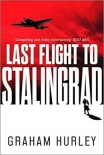Last Flight to Stalingrad by Graham Hurley (simple ebook reader .TXT) 📗

- Author: Graham Hurley
Book online «Last Flight to Stalingrad by Graham Hurley (simple ebook reader .TXT) 📗». Author Graham Hurley
At first Nehmann assumed he’d gone out for some fresh air. It happened sometimes. He’d get up for a piss, still fully clothed after a night’s sleep, and Nehmann would meet him on the stairs that led up to the freezing concrete space that had once been a waiting room upstairs. Kirile had the knack of acquiring supplies of the harsh Russian tobacco from newly taken prisoners and always smoked outside because he knew everyone else loathed the smell. But when Nehmann went upstairs to look, there was no sign of him.
By mid-morning he still hadn’t returned. Nehmann and Grimberger were due to meet a supply flight from Tatsinskaya at Pitomnik. The flight was carrying sacks of Luftpost, including a special package for Schultz. The plane was late, wallowing in to land through yet more flurries of snow, zigzagging across the airfield to avoid shell craters. Nehmann knew the pilot, a friend of Messner, and he listened to him moaning about Goering while Nehmann’s gaze settled on a nearby bunch of prisoners, two of them barefoot in the snow, unloading the aircraft. The big plane was only half full and Nehmann watched the boxes passing from hand to hand, wondering whether Kirile might be planning to somehow make it onto a plane out.
The pilot was checking his watch. Goering had evidently promised Hitler aircraft and supply flights he knew he couldn’t possibly deliver. Worse still, the fucking man had now gone off to Paris to buy yet more fucking pictures, leaving Fliegerkorps VIII to pick up the pieces. The staff sergeant on the airfield had been keeping a tally of deliveries over the last week and yesterday he’d threatened to jump on a plane to Tatsinskaya and have it out with Richthofen personally, and the pilot didn’t blame him. A bare handful of tons a day when the army needed ten times that? Madness.
Back at the bus depot, Nehmann met Schultz in the empty shell of the waiting room. Schultz was looking up at the fading map of the city’s bus routes that dominated one wall. He drew Nehmann’s attention to a black daub on the bottom right-hand corner of the map, within easy reach of someone standing amid the litter of broken glass. Two letters. SS.
‘Was that here yesterday?’ he asked.
Nehmann said he didn’t know. Might have been. Might not.
‘You’re thinking…?’ Nehmann took a closer look.
Schultz shrugged. Kirile had gone, and the black daub explained why.
‘Fuckers’, he grunted, looking at the route map again.
*
Nehmann didn’t give up. He blamed himself for not keeping a closer eye on his fellow Georgian. Schultz was probably right about the SS. People like Kalb were fanatics. They lived in a world of their own making and they never gave up. Would they use Kirile the way Schultz had? Would they put his perfect Russian to work when they conducted their own interrogations with Soviet prisoners? Was that why they’d bided their time, and hatched the plans, and waited for the moment when Kirile – sleepy, badly needing a smoke – had emerged into yet another grey Stalingrad dawn? Nehmann rather hoped so. That way, the poor bastard would at least stay alive.
Grimberger had a different take on the incident. He started carrying an extra gun, a Walther P38 with a nine-round magazine. In his view, Kirile’s disappearance was a declaration of war. Nehmann, for whatever reason, would be next. He’d been at the church on the night of the party. He’d witnessed the scene at the top of the vestry steps. He knew these SS people and he knew that a moment of humiliation like that wasn’t something they’d ever tolerate. Sooner or later they’d be back.
Nehmann said he didn’t care, which wasn’t strictly true. The weather was getting worse. Day after day, Nehmann awoke to freezing fog and plunging temperatures and seven kinds of grey masking the view from the bus station, but wherever he and Grimberger went, whatever the reason for their journey, he was still thinking about Kirile. He knew that looking for someone gone missing in the city of the lost was absurd, surreal, a non-starter. People were muffled against the cold, their heads down, only their eyes visible. Kirile would be wearing the same ragbag of German and Soviet clothing as everyone else. How would he recognise him? Where would he start?
It didn’t matter. Paying a visit to the front line was dangerous, and Grimberger was visibly unhappy about the prospect, but Nehmann insisted he needed to talk to infantrymen in the very eye of the storm and so they made their way towards the sullen hump of the Mamaev Kurgan, taking advantage of the ruined buildings and mountains of debris, following the black telephone lines that snaked ever onwards.
The trenches here were mere scrapes, minor adjustments to the chaos of the battlescape, fought over, died for, abandoned and retaken within the same half-hour. The Russians were barely twenty metres away, equally exposed, but somehow they seemed to have the upper hand.
A Wehrmacht staff sergeant with a weeping infection in one eye talked of Stukas dropping bombs barely metres away, of the incessant rain of Soviet mortars, of a local sniper who could pick your teeth from a thousand metres, of taunting melodies from a Russian harmonica in the darkness, of close-quarters fighting with knives, sharpened spades, bare hands, anything. Worst, he said, were the Siberians. They were born hunters. They stole into your little world from fucking nowhere. This was the Rattenkrieg,he said. The War of the Rats. The dead of night was a phrase he never wanted





Comments (0)